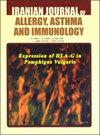β- d -甘露醛酸(M2000)与COVID-19炎症因子的关系体外研究。
IF 1.2
4区 医学
Q4 ALLERGY
Iranian journal of allergy, asthma, and immunology
Pub Date : 2022-12-24
DOI:10.18502/ijaai.v21i6.11528
引用次数: 2
摘要
2019年冠状病毒病(COVID-19)可并发急性呼吸窘迫综合征(ARDS),并可能与细胞因子风暴和多器官衰竭有关。抗炎药,如全身皮质类固醇、单克隆抗体和非甾体抗炎药(NSAIDs)可用于此目的。在本研究中,我们评估了新型非甾体抗炎药甘露醛酸(M2000)对covid -19相关细胞因子风暴的免疫调节作用。本研究是在体外对30名向转诊中心提出ARDS的COVID-19患者的血液样本进行的。从血样中分离外周血单个核细胞(PBMCs),与肉豆酸酯phorbol醋酸酯孵育24小时。37℃孵育4小时后,以25µg/孔和50µg/孔的剂量给药M2000。采用实时定量聚合酶链反应(qRT-PCR)检测mRNA基因表达情况。采用酶联免疫吸附法(ELISA)评价PBMC上清中白细胞介素(IL)-6、IL-17、肿瘤坏死因子(TNF)-α、干扰素(IFN)-γ的水平。与对照组相比,M2000治疗的COVID-19患者外周血中IL-17、TNF-α、IL- 6和IFN - γ的mRNA表达和上清水平均降低。基于体外模型,首次观察到M2000可有效缓解COVID-19患者的炎症级联反应。经过进一步的体外和动物模型研究,M2000可被认为是一种用于COVID-19患者的新型非甾体抗炎药。本文章由计算机程序翻译,如有差异,请以英文原文为准。
β-D-mannuronic Acid (M2000) and Inflammatory Cytokines in COVID-19; An In vitro Study.
coronavirus disease of 2019 (COVID-19) can be complicated by acute respiratory distress syndrome (ARDS) and may be associated with cytokine storm and multiorgan failure. Anti-inflammatory agents, such as systemic corticosteroids, monoclonal antibodies, and nonsteroidal anti-inflammatory drugs (NSAIDs) can be used for this purpose. In this study, we evaluated the immunomodulatory effect of mannuronic acid (M2000), which is a novel NSAID, on COVID-19-related cytokine storms. This study was conducted in vitro on blood samples of 30 COVID-19 patients who presented with ARDS to a referral center. Peripheral blood mononuclear cells (PBMCs) were isolated from blood samples and incubated with phorbol myristate acetate for 24 hours. M2000 was administered with the dosages of 25 µg/well and 50 µg/well after 4 hours of incubation at 37°C. The quantitative real-time polymerase chain reaction (qRT-PCR) was conducted to assess mRNA gene expression. Enzyme-linked immunosorbent assay (ELISA) was performed to evaluate the supernatant PBMC levels of interleukin (IL)-6, IL-17, tumor necrosis factor (TNF)-α, and interferon (IFN)-γ. Both mRNA expression and the supernatant PBMC levels of IL-17, TNF-α, IL‑6, and IFN‑γ were decreased in PBMCs of COVID-19 patients treated with M2000 compared with the control group. For the first time, it was observed that M2000 could be effective in alleviating the inflammatory cascade of COVID-19 patients based on an in vitro model. After further studies in vitro and in animal models, M2000 could be considered a novel NSAID drug in COVID-19 patients.
求助全文
通过发布文献求助,成功后即可免费获取论文全文。
去求助
来源期刊
CiteScore
2.60
自引率
6.70%
发文量
64
审稿时长
>12 weeks
期刊介绍:
The Iranian Journal of Allergy, Asthma and Immunology (IJAAI), an international peer-reviewed scientific and research journal, seeks to publish original papers, selected review articles, case-based reviews, and other articles of special interest related to the fields of asthma, allergy and immunology. The journal is an official publication of the Iranian Society of Asthma and Allergy (ISAA), which is supported by the Immunology, Asthma and Allergy Research Institute (IAARI) and published by Tehran University of Medical Sciences (TUMS). The journal seeks to provide its readers with the highest quality materials published through a process of careful peer reviews and editorial comments. All papers are published in English.

 求助内容:
求助内容: 应助结果提醒方式:
应助结果提醒方式:


